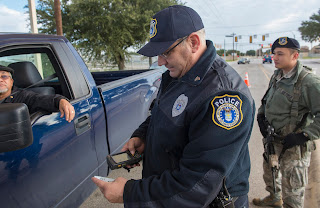When is a traffic ticket not an ordinary traffic ticket? When the violation occurs on a military base and you are charged with a federal crime. A district court violation notice (DCVN) or "ticket" may be issued by a federal law enforcement officer for violations of certain federal laws and, if occurring on federal property, certain state laws. Violations include improper parking, illegal camping, speeding, civil disturbances, fish and wildlife infractions, and other offenses.
According to 32 CFR 634.32 - Traffic Violation Reports - (a) Most traffic violations occurring on DOD installations (within the United States or its territories) should be referred to the proper U.S. Magistrate.
Note however that, violations are not referred [to the U.S. Magistrate] when "(4) A U.S. Magistrate is available but the accused refuses to consent to the jurisdiction of the court and the U.S. Attorney refuses to process the case before a U.S. District Court."
According to the US Courts web-site: "The Central Violations Bureau (CVB) is a national center charged with processing violation notices (tickets) issued and payments received for petty offenses committed on federal property."
If you choose to contest the DCVN and appear in court, you will initially be scheduled to appear before a U.S. Magistrate.
Once the complaint of information is filed, a date is set for the defendant to appear before the United States Magistrate Judge for arraignment. In cases where an arrest has been made prior to the filing of a complaint or information, the arraignment occurs immediately.
The arraignment before the United States Magistrate Judge is a hearing during which the defendant is informed of his or her rights, advised of the right against self-incrimination, informed about assistance of counsel, notified of his or her right to have the case heard before a United States District Court Judge or before a United States Magistrate Judge, and notified of the dates for further proceedings in the case.
You will be asked to consent to the jurisdiction of the magistrate judge and will be presented with a consent form. You may consent to the jurisdiction of the magistrate judge or you may elect to have your case assigned to a U.S. District Court judge.
Now, in any case before the court you should always consult with legal counsel (an attorney). There are good reasons both to consent to and deny the jurisdiction of the magistrate judge.
In the case of a DCVN issued on a military installation, you may want to have your case heard before a U.S. District Court Judge. The United States Attorney may choose to drop a case rather than proceed before the U.S. District Court, but I think more importantly the District Court Judge will be more likely to consider your case favorably. This is not to say anything negative about the U.S. Magistrate judges - they are certainly very honorable men and women - but they hear the majority of DCVN cases and may be (maybe) more inclined to side with the police officer over the defendant.
The National Motorists Association (NMA) (March 23, 2018) asked: "Did you ever feel that when you received a traffic ticket you were already considered guilty even though under the U.S. Constitution you are innocent until proven guilty? ... Traffic ticket defendants are [treated as if they are] guilty until they prove their innocence, police officer testimony is automatically given more credence than that of ticket recipients, and those same officers are allowed to testify via scripts that have little bearing on reality or facts... But what if you feel you did not violate the law? The NMA always encourages anyone whether they feel they are guilty or not, to FIGHT YOUR TICKET! If just ten percent of all traffic tickets went to trial, the court system would cease to function."
And if just ten percent of all DCVNs were taken to U.S. District Court... ?
Of course, the best way to deal with a DCVN is not to get one in the first place.



No comments:
Post a Comment
Note: Only a member of this blog may post a comment.